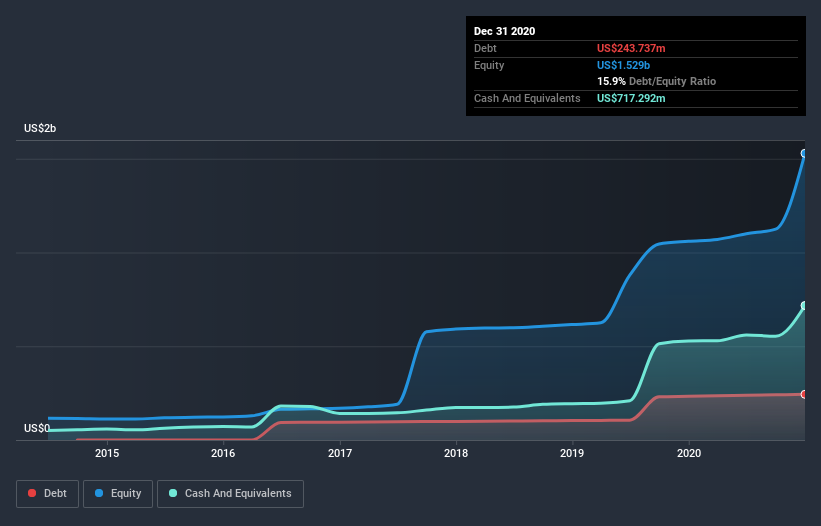These 4 Measures Indicate That Repligen (NASDAQ:RGEN) Is Using Debt Safely
Legendary fund manager Li Lu (who Charlie Munger backed) once said, 'The biggest investment risk is not the volatility of prices, but whether you will suffer a permanent loss of capital.' When we think about how risky a company is, we always like to look at its use of debt, since debt overload can lead to ruin. We note that Repligen Corporation (NASDAQ:RGEN) does have debt on its balance sheet. But the more important question is: how much risk is that debt creating?
Why Does Debt Bring Risk?
Generally speaking, debt only becomes a real problem when a company can't easily pay it off, either by raising capital or with its own cash flow. In the worst case scenario, a company can go bankrupt if it cannot pay its creditors. However, a more usual (but still expensive) situation is where a company must dilute shareholders at a cheap share price simply to get debt under control. Of course, plenty of companies use debt to fund growth, without any negative consequences. When we examine debt levels, we first consider both cash and debt levels, together.
See our latest analysis for Repligen
What Is Repligen's Debt?
As you can see below, at the end of December 2020, Repligen had US$243.7m of debt, up from US$232.8m a year ago. Click the image for more detail. However, it does have US$717.3m in cash offsetting this, leading to net cash of US$473.6m.
How Strong Is Repligen's Balance Sheet?
According to the last reported balance sheet, Repligen had liabilities of US$319.0m due within 12 months, and liabilities of US$54.8m due beyond 12 months. On the other hand, it had cash of US$717.3m and US$71.4m worth of receivables due within a year. So it actually has US$414.9m more liquid assets than total liabilities.
This short term liquidity is a sign that Repligen could probably pay off its debt with ease, as its balance sheet is far from stretched. Succinctly put, Repligen boasts net cash, so it's fair to say it does not have a heavy debt load!
In addition to that, we're happy to report that Repligen has boosted its EBIT by 83%, thus reducing the spectre of future debt repayments. There's no doubt that we learn most about debt from the balance sheet. But it is future earnings, more than anything, that will determine Repligen's ability to maintain a healthy balance sheet going forward. So if you're focused on the future you can check out this free report showing analyst profit forecasts.
Finally, a business needs free cash flow to pay off debt; accounting profits just don't cut it. While Repligen has net cash on its balance sheet, it's still worth taking a look at its ability to convert earnings before interest and tax (EBIT) to free cash flow, to help us understand how quickly it is building (or eroding) that cash balance. Over the most recent three years, Repligen recorded free cash flow worth 69% of its EBIT, which is around normal, given free cash flow excludes interest and tax. This free cash flow puts the company in a good position to pay down debt, when appropriate.
Summing up
While it is always sensible to investigate a company's debt, in this case Repligen has US$473.6m in net cash and a decent-looking balance sheet. And it impressed us with its EBIT growth of 83% over the last year. So we don't think Repligen's use of debt is risky. When analysing debt levels, the balance sheet is the obvious place to start. However, not all investment risk resides within the balance sheet - far from it. For example, we've discovered 2 warning signs for Repligen that you should be aware of before investing here.
Of course, if you're the type of investor who prefers buying stocks without the burden of debt, then don't hesitate to discover our exclusive list of net cash growth stocks, today.
This article by Simply Wall St is general in nature. It does not constitute a recommendation to buy or sell any stock, and does not take account of your objectives, or your financial situation. We aim to bring you long-term focused analysis driven by fundamental data. Note that our analysis may not factor in the latest price-sensitive company announcements or qualitative material. Simply Wall St has no position in any stocks mentioned.
Have feedback on this article? Concerned about the content? Get in touch with us directly. Alternatively, email editorial-team (at) simplywallst.com.

